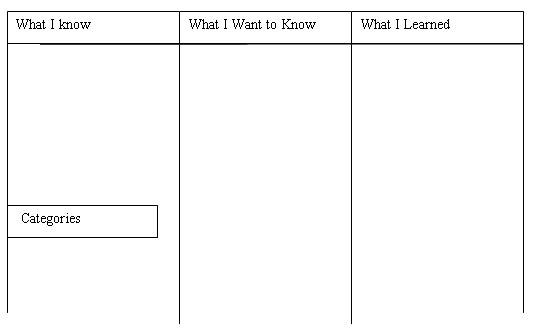
Advance Organizer:
KWL is a metacognitive format, advance organizer that involves a three part thinking process which asks the learner to respond: 1) to what they know prior to instructional input, 2) to what they want to know as a result of the instructional input, and 3) to what they have learned after the instructional input. Thus, KWL is Know, Want to know, Learn.
The process performs three services. First, it activates previous knowledge or schema the student may have about the topic. Second, it provides a purpose for learning. Third, it provides a summary of what has been learned.
Donna Ogle suggests that after initial brainstorming, students identify general categories of information that students may encounter during the instructional input.
Egan (May 1999, Journal of Adolescent and Adult Literacy) suggests a modification she calls Six-step Topical Guide (SSTG) divided as follows: A) What I know definitely, B) What I think I know, C/D) Read and verify, E) Questions about the reading, and F) Where to find answers. Schmidt (April 1999, The Reading Teacher) suggests the KWLQ modification which adds to KWL the fourth dimension of more Questions. Alvermann and Phelps (1998) and Ridgeway (1999) propose that KWL be modified to KNL; i. e., Know, Need to know, Learn.
These strategies can readily be adapted to individual instruction, small group instruction or even whole class instruction.
based on Ogle, D. February 1986. The Reading Teacher, v. 39.
